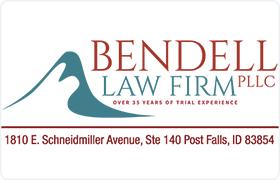Marshall Criminal Lawyer, Washington
Sponsored Law Firm
-
 x
x

Click For More Info:
-
The Bendell Law Firm, PLLC
1810 E Schneidmiller Ave, Suite 140, Post Falls, ID 83854» view mapCriminal Defense, Accident & Injury Law You Don’t Pay If We Don’t Win
With deep experience and a multi-faceted perspective and understanding of Idaho and Washington law, we can help you achieve the best results in a variety of practice areas.
208-981-0555
Senit M Lutgen
Criminal, Civil & Human Rights, Litigation, Malpractice
Status: In Good Standing *Status is reviewed annually. For latest information visit here Licensed: 22 Years
Clark Darrel Colwell
Criminal
 James Bendell Post Falls, ID
James Bendell Post Falls, ID Practice AreasExpertise
Practice AreasExpertise